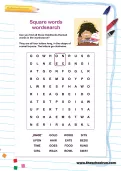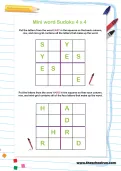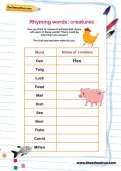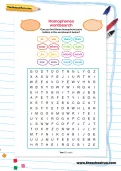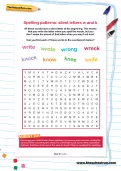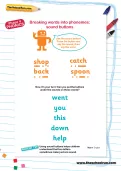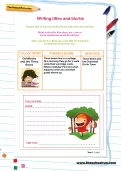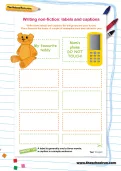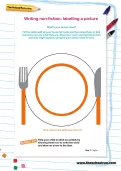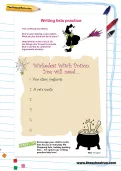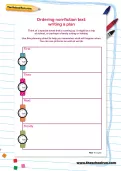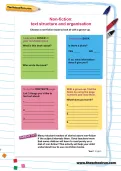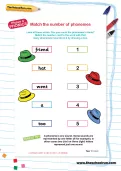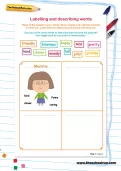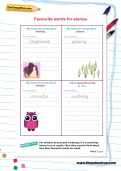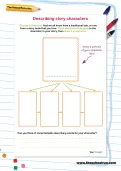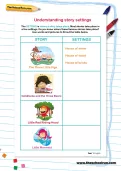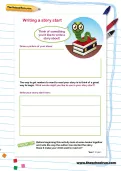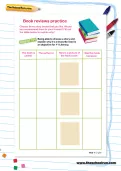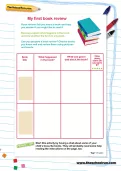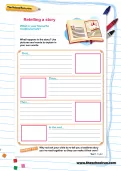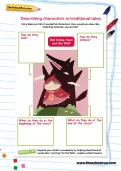Learn about phonemes: press the button and say the sound, then say the word.
or
Register to add to your saved resources
Already a subscriber? to view this content.
Choose one of your favourite stories and write down its title. Write a blurb for this story, too – two or three sentences would be perfect. Then, just for fun, think up a new title for the story!
or
Register to add to your saved resources
Already a subscriber? to view this content.
Write some labels and captions for things around your house. Place them on the items. Remember: a label is generally one to three words; a caption is a simple sentence.
or
Register to add to your saved resources
Already a subscriber? to view this content.
What’s your dream meal? Fill this plate with all your favourite foods and then label them so that everyone can see what they are.
or
Register to add to your saved resources
Already a subscriber? to view this content.
Help Wendy Witch write a list of all the ingredients she’ll need to include in her new potion.
or
Register to add to your saved resources
Already a subscriber? to view this content.
Can you use words and pictures to describe your favourite TV programme? What was it called? What happened? What did you like about it?
or
Register to add to your saved resources
Already a subscriber? to view this content.
Roll the die and see how many words you can think of that start with that sound.
or
Register to add to your saved resources
Choose a non-fiction book to read with your mum or dad. Can you use the contents and index pages? Use the spidergram to write about what you have learnt.
or
Register to add to your saved resources
Already a subscriber? to view this content.
Think of a special event that is coming up. Use this planning sheet to help you remember what will happen when. You can use pictures as well as words.
or
Register to add to your saved resources
Already a subscriber? to view this content.
Use non-fiction books to help your child understand text structure and organisation.
or
Register to add to your saved resources
Already a subscriber? to view this content.
Can you count the phonemes (sounds) in the words then match the number card to the word?
or
Register to add to your saved resources
Already a subscriber? to view this content.
Draw a picture of a family member then label it and add some words to describe them around the picture.
or
Register to add to your saved resources
Already a subscriber? to view this content.
For children to succeed in literacy, it’s crucial they have a love of words. Here they need to think about how their favourite words are used.
or
Register to add to your saved resources
Already a subscriber? to view this content.
Choose a character that we all know from a traditional tale, or one from a story book that you love. Think about what happens to the character in your story, then draw it in pictures.
or
Register to add to your saved resources
Already a subscriber? to view this content.
Stories take place in different settings. Can your child use their knowledge of traditional tales to identify the story settings for these well-known stories?
or
Register to add to your saved resources
Already a subscriber? to view this content.
Writing great stories begins with choosing a fantastic opening idea and sentence. Help your child practise writing engaging story starts with our worksheet, designed for Y1 children.
or
Register to add to your saved resources
Already a subscriber? to view this content.
Book reviews are a very common writing activity for KS1 children. Help your child get used to the format and including all the different elements with this template worksheet. They can use pictures to express their views, too! Ideal for Y1 learners.
or
Register to add to your saved resources
Already a subscriber? to view this content.
As your child grows more confident in their reading they will be asked to reflect on what they read and review it. Help them get used to reviewing books with our template – they can use words and pictures to share their views. Will they give the latest reading practice book five stars or one?
or
Register to add to your saved resources
As reading becomes easier your child will be able to reflect on story events and sequences more. Help them reflect on stories they enjoy with this worksheet, aimed at Y1 reader and writers.
or
Register to add to your saved resources
Already a subscriber? to view this content.
A first reading comprehension activity for Y1 children. Can they describe characters like Little Red Riding Hood and Cinderella from traditional tales?
or
Register to add to your saved resources
Already a subscriber? to view this content.
